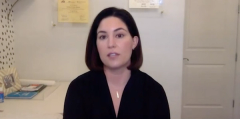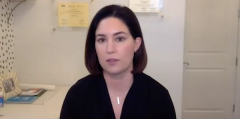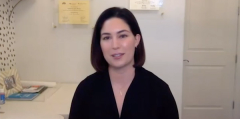
Key Considerations for Individualizing Therapy in CLL
Episodes in this series

Experts in the field of chronic lymphocytic management [CLL] discuss important disease-related factors to take into consideration when determining a patient’s therapy regimen.
Katie Culos, PharmD, BCOP: NCCN is going to be a big driver of what our first-line treatment options are. However, as you mentioned, there are many different patient-specific factors that will just find the optimal regimen for a brand new diagnosed CLL patient. I know there are several other important factors that you will take into consideration when choosing their regimens. Can you highlight a few more, maybe the disease-related factors that would push you towards one regimen choice over another?
Daniel Wojenski, PharmD, BCPS, BCOP: Absolutely. I think it’s really important to discuss a number of factors with our patients, and some of those include discussing the level of data of information that we have with them, where we will discuss how much information we have with ibrutinib, how much information we have with venetoclax and acalabrutinib. Other factors that I always want to discuss with our patients include looking at the duration of therapy. So it’s very important for a lot of our patients. Ibrutinib is something that you’re going to be taking continuously versus a fixed duration of a venetoclax-based regimen that’s going to be a year, and I know that a lot of patients would prefer just to have one-year treatment versus taking something continuously.
We also like to discuss different toxicities with patients. Obviously, with prolonged therapy with BTK inhibitors, we see in the studies that there are increased toxicities that occur and increased discontinuation due to those adverse events. Certainly, based on the patient’s actually disease factor history, so we will help guide therapy for those individuals. For example, patients with a history of arrhythmias or poorly controlled hypertension may benefit from an alternative therapy such as venetoclax until we’re able to balance those comorbidities and that history for potential future cycles with a BTK inhibitor.
Now, some of the mutational things that we’re also discussing with our patients are looking at IGHV mutation status. We know that patients with a mutated IGHV do still tend to respond to chemotherapy and therefore, some of those can still be addressed if that is an option for patients such as with FCR. Other patients who have mutational status such as deletion 17p, deletion 11q, that may have high-risk prognostic factors for negative outcomes. Generally, what we’ve seen is with those patients we know that they’re going to benefit from therapies such as a BTK inhibitor or venetoclax rather than chemotherapy because they generally don’t have a good response to chemoimmunotherapy for those patients. So looking at all these factors, talking to the patients, we will come up with a specialized approach or an individualized approach, rather, to what option is ideal for these patients.
Newsletter
Stay informed on drug updates, treatment guidelines, and pharmacy practice trends—subscribe to Pharmacy Times for weekly clinical insights.


































